Workshops
Dissemination, Meetings and Training Events
A record of the meetings, training and dissemination events of the CERA Alliance.
During the global Covid-19 pandemic, the CERA projects have worked together to deliver a series of virtual training workshops in collaboration with our international partners. In lieu of being able to meet in person, the workshops have helped us to meet project milestones and deliverables at the same time as enabling us to share our research with a wider audience.
ACERA Consortium Training, 26-30 April 2018 - Kampala (Uganda)
The four days training was divided into two, with the first two days for ACERA internal meeting. Tour of CREEC & CEDAT research facilities were carried out, project progress in all the three Consortium University were discussed and evaluated. Financial and administrative issues discussed and commitments reaffirmed. The last two days were opened to the invited audience in accordance with the objectives of the consortium. The discussions and actions points from the training workshop has been organized under two section of:
- The Consortium Meeting program
- The stakeholder training program and participants
ACERA Consortium Meeting, 30-2 August 2018 - Dar Es Salam (Tanzania)
Dar es Salam Institute of Technology (DIT) conducted a four days training on "Business modeling/grant proposal writing to solicit funding in promoting Renewable Energy Technologies", with the relevant stakeholder in the renewable energy sector.
Royal Society Visit to Kampala, Uganda - 21st September 2018
The Programme Manager’s visit to Makerere Univeristy began on Thursday 20th with meetings and tours with the AfriWatSan research team. On Friday 21st September, the ACERA team hosted the Programme Manager at College of Engineering, Design, Art and Technology (CEDAT) where meetings were held with key project staff. The goal of the visit was to meet the ACERA team and Makerere University‘s top management, visit the labs and laboratory staff, discuss progress of the research and the administrative aspects, and to reinforce the funder’s commitment to the programme.
CRESUM-HYRES and ACERA Interdisciplinary Workshop, Kew Gardens (UK), June 2019
Plant Power: Bioenergy as a Renewable Resource
New technologies path the way to provision of clean, affordable energy supplies that can stimulate local economies, improve health and prevent environmental degradation.Plants capture energy from the sun and this can be released in many different ways to create heat, generate biogas, electricity for mini-grids and bio-renewable chemicals.
This interdisciplinary workshop brings together international expertise to develop ideas and collaboration to a theme that is fundamental for sustainable development, poverty alleviation, biodiversity conservation and mitigating climate change. Key topics will include biogas from invasive water hyacinth and bioenergy in mini-grids with presentations from energy projects in Uganda, Tanzania, Congo-Brazzaville, Indonesia and India.
CRESUM-HYRES and ACERA National Workshop in Jakarta, December 2019
Clean and Affordable Renewable Energy for Sustainable Rural and Remote Areas through Microgrids. Ashley Hotel, Jakarta, 5-6 December 2019.
The EPSRC-funded CRESUM-HYRES project and the DfiD and Royal Society funded ACERA project hosted a national workshop in December 2019 in Jakarta.
Highlights from the workshop can be found here:
CREEC Communications Training, 2-5 March 2020, Kampala (Uganda)
The aim of this training was to increase communications capacity in the team, with specific reference to the output stage of the ACERA project.
The training took place over four days in Kampala. It included meetings with the team, 121 time with the PR officer, and a workshop. The latter modeled how to use co-design methodology to create a communications strategy, and therefore build capacity within the wider CREEC team.
CRESUM-HYRES and ACERA Workshops, September 2020 (online)
In September last year, the CRESUM-HYRES and the ACERA Royal Society Capacity Building projects collaborated to run a series of free, virtual training workshops to share research by the project and its partners.
The workshops ran on the 4th, 10th and 17th September.
Creating resilient sustainable micro-grids - 4th September 2020
Globally, one in five people still lack access to modern electricity, and 3 billion people rely on traditional fuels for heating and cooking. In line with United Nations Sustainable Development Goal 7, the UKRI-funded GCRF project CRESUM-HYRES and the Royal Society-funded ACERA project organised a virtual workshop to showcase some of the work done by the project, our partners, and prominent researchers in the area to increase access to affordable, reliable, sustainable and modern energy for all.
Furthermore, this virtual workshop provided the opportunity for companies, stakeholders, engineers, technicians, scientists, researchers, and scholars to disseminate information on recent advancements and achievements in operation, control, and planning of microgrids. The virtual training workshop included three sessions focused on:
1. Towards Resilience, flexibility, and Sustainability in Remote Microgrids
2. Planning of Sustainable Microgrids
3. Operation of Sustainable Microgrids
Also, the first session was concluded by a panel discussion involving three keynote speakers with strong experience of leading research projects on modern microgrids across the world.
Introduction by Jon Lovett, Chair in Global Challenges, University of Leeds
2nd Keynote Speaker - Pierluigi Mancarella, University of Melbourne
3rd Keynote Speaker - David Laverty, Queens University, Belfast
Shahab Dehghan, University of Leeds
Elisabeth Rianawati, RDI, Indonesia
Nina Rangel Ortiz, University of Leeds
Mary Suzan Abbo, CREEC, Uganda
Consalva Msigwa, University of Dar es Salaam, Tanzania
Agnes Nakiganda, University of Leeds
Kostas Latoufis, University of Athens
Mingjia Yin, University of Leeds
Renewable energy technologies & resilient generation capacity for micro-grids - 10th September 2020
UKRI-funded GCRF project CRESUM-HYRES presents a virtual workshop to showcase work achieved in line with UN Sustainable Development Goal 7.
About this Event
Globally, one in five people still lack access to modern electricity, and 3 billion people rely on traditional fuels for heating and cooking. In line with United Nations Sustainable Development Goal 7, the UKRI-funded GCRF project CRESUM-HYRES and the Royal Society-funded ACERA project organised a virtual workshop to showcase some of the work done by the project, our partners, and prominent researchers in the area to increase access to affordable, reliable, sustainable and modern energy for all.
Furthermore, this virtual workshop (as part of three online CRESUM-HYRES events scheduled in September 2020), provided the opportunity for stakeholders, engineers, technicians, scientists, researchers, and scholars to disseminate information on recent advancements and achievements in renewable energy generation for development of resilient MICRO-GRIDS in developing nations. This virtual workshop focussed on sustainable generation included three sessions dedicated to:
1. Opportunities for renewable energy technologies in developing nations
2. Sustainable generation activities in CRESUM-HYRES
3. Case studies on renewable energy generation for rural development
The workshop included a plenary session by the eminent Chemical Engineer Prof JB Joshi from ICT Mumbai, focussing on the opportunities for renewable energy generation in India. Topics covered in the workshop included opportunities for using bioenergy, solar PV and solar thermal as well as hybrid renewable energy technologies, assessments of available resources and simulation of proposed solutions.
The workshop disseminated progress from the GCRF/EPSRC funded CRESM HYRES project on Creating Resilient Sustainable Micro-grids through Hybrid Renewable Energy Systems. The workshop also discussed links between interdisciplinary energy related international projects currently running at Leeds and funded through BBSRC, EPSRC, Innovate UK and the Royal Society.
Plenary Speaker: Prof JB Joshi (ICT) India
Keynote speakers: Dr Vishwaneth Dalvi (ICT, India), Mary Suzan Abbo (CREEC, Uganda)
CRESUM-HYRES speakers include Prof Jon Lovett (UoL), Dr Valerie Dupont (UoL), Dr Rolf Crook (UoL), Dr Hu Li (UoL), Dr Andrew Ross (UoL).
Micro-grids tailored to the community's resources, needs, and aspirations - 17th September 2020
About this Event
The Global Challenge Research Fund and EPSRC-funded project, Creating Resilient Sustainable Microgrids through Hybrid Renewable Energy Systems (CRESUM-HYRES) and the Royal Society-funded ACERA projects organised this workshop on socio-economic issues of micro-grids in developing countries.
Introduction
The world is undergoing an energy transition to a more environmentally friendly and resilient future. The technology is now available to achieve Goal 7 of the UN Sustainable Development Goals (SDGs) “Ensure access to affordable, reliable, sustainable and modern energy for all”. But the major constraints to achieving SDG 7 and the energy transition are often not technical, but political and socio-economic. This one-day online conference brought together researchers and practitioners to present and discuss the latest findings on the socio-economics of creating resilient sustainable micro-grids.
This conference was part of CRESUM-HYRES project, particularly the working package 2: the socio-economic component of the project (WP2) which has been undertaken for the last several years. The socio-economic component of the project focuses on five interacting components: evaluating the potential range of energy uses within a community and matching technologies to both present and future needs; involvement of end user participation in research, design, acceptance and adoption; ensuring long-term sustainability and resilience through creation of the appropriate incentive structures to install and maintain the MGs; ethical dimensions of the project; and capacity building within the partnership. It involves all the partners in Africa and Indonesia
Aim of the Conference
Drawing on results from a major renewable energy research project in Indonesia and Africa, the aim of the conference was to build a network of knowledge to facilitate successful creation of micro-grids.
Speakers
Speakers included: Prof. Jon Lovett (University of Leeds), Tony Susandy (Ministry of Energy and Mineral Resources of Indonesia), Prof. Francis Kemausuor (Kwame Nkrumah University of Science and Technology, Ghana), Nelson Tashobya (AOT Consultant), Dr Mary Suzan Abbo (Center for Research of Energy and Energy Conservation - CREEC), Dr Cheng Wen (University of Leeds), Dr Saut Sagala (Resilience Development Initiative).
Cheney Fellowship - Bioenergy and Cookstoves Workshop, December 2020 (online)
The Role of Bioenergy as Part of a Global Solution for Achieving Sustainability
The workshop consisted of presentations from the speakers outlined below and there was also a discussion and Q&A section.
Speakers included:
Professor Omar Masera Cerutti
Head of the Group on Ecotechnology and Bioenergy Innovation at UNAM (GIEB-UNAM), Morelia, Mexico
Co-creating Local Solutions to Global Problems - The Experience of the Group of Innovation on Ecotechnology and Bioenergy (GIEB)
The presentation will summarise GIEB´s vision, approach, areas of research and main findings in the area of small-scale bioenergy and ecotechnologies.
Dr Montserrat Serrano Medrano
Institute of Ecosystems and Sustainability Research, UNAM, Mexico
Is the Mexican residential sector in the pathway to a sustainable energy transition?
This study presents the results of an investigation focused on analysing the National Survey of Household Energy Consumption (ENCEVI for its acronym in Spanish) released at the end of 2018.
In particular, this survey included important and specific aspects of energy for cooking at a household level such as the secondary fuel for cooking, type of device for cooking, permanence of traditional devices, willingness to change current fuel of cooking and type of fuel considered for replacement.
Dr Alberto Beltrán Morales
Materials Research Institute (IIM), UNAM, Mexico
Transport phenomena in biomass plancha-type cookstoves: Numerical study
In this presentation numerical simulations for biomass plancha-type cookstoves are presented. In particular, the fluid flow, heat transfer and and gas-phase chemical reactions are modelled using ANSYS Fluent. Numerical results are compared with theoretical models for different variables and with experimental data.
Professor Jon Lovett
Chair of Global Challenges, School of Geography, University of Leeds, UK
Plant Power: Opportunities and challenges for meeting sustainable energy needs from the plant and fungal kingdoms
Bioenergy is a major component of the global transition to renewable energy technologies. The plant and fungal kingdoms offer great potential but remain mostly untapped.
A shift towards diversified, accessible bioenergy technologies will help to mitigate and adapt to the threats of climate change, decrease energy poverty, improve human health by reducing indoor pollution, increase energy resilience of communities, and decrease greenhouse gas emissions from fossil fuels.
https://doi.org/10.1002/ppp3.10147
Agnes Naluwagga
Centre for Research in Energy and Energy Conservation (CREEC), Kampala, Uganda
Head, Regional Testing and Knowledge Centre (RTKC)
Research and training on clean cooking in Uganda.
"Enhancing access to Clean Cooking in Uganda: The CREEC Approach”
This presentation will cover the state of cooking in Uganda with specific insights into CREEC’s approach to increasing access to cleaner cooking solutions within the country, including: research areas, quality testing and standards, sector coordination and more!
David Maxwell
School of Chemical and Process Engineering, University of Leeds, UK
Emissions from the combustion of torrefied and raw biomass fuels in a domestic heating stove
Decarbonising space heating is a key part of many countries strategies to prevent climate change.
According to the Clean Air Act 2019, UK, combustion of solid fuels in homes contributed to 38% of PM emissions. Therefore, understanding the fuels used and the emissions created from combustion of biomass in domestic stoves is paramount.
https://doi.org/10.1016/j.fuproc.2019.106266
We are grateful to support from the Cheney Fellowships Scheme, which has enabled us to build a programme of collaboration between the University of Leeds in the UK and UNAM in Mexico.
The research and capacity building is funded by the EPSRC grants to the CRESUM-HYRES and Doctoral Training Centre projects, the BBSRC grant to the BEFWAM project, the Royal Society Africa Capacity Building Initiative, IIES, UNAM campus Morelia, GIEB and BCS cluster in Mexico.
CRESUM-HYRES and ACERA Mini-grids Business Models Workshop, January 2021 (online)
CRESUM-HYRES and ACERA January 2021 Mini-grids Business Models Workshop
On the 20th January 2021, the EPSRC funded CRESUM-HYRES and the Royal Society-funded ACERA projects hosted a free training workshop exploring the current and latest developments in business models for mini-grids.
The event was well attended and we had a fantastic range of speakers.
Watch the event recording here.
The workshop to explored the latest developments in business models for mini-grids. We heard from experts in a number of countries about the diverse range of models being used, insights on key success factors in different contexts and the challenges that remain.
The speakers were:
Peter Weston, Director of Programmes, Energy 4 Impact
'Mini-grid Business Models in Africa'
Eileen Lara, Head of Solar and Energy Efficiency, Centre for Research in Energy and Energy Conservation (CREEC)
Francis Kemausuor, The Brew-Hammond Energy Centre
'Mini-grids for last mile electrification: Ghana's experience'
Saut Sagala, Resilience Development Initiative
Cheng Wen, University of Leeds
Access to modern forms of energy underpins many of the services that meet basic human needs, yet in developing countries 1.1 billion people still have little or no access to electricity. While rapid progress is being made in some countries, further efforts are needed to meet the SDG goal of universal access to affordable, reliable and modern energy services by 2030.
Advances in solar PV, batteries and other technologies are being harnessed in mini-grids to bring electricity to villages and isolated communities where there is no affordable grid connection. However, challenges remain in finding appropriate business models that balance the needs of energy users with mini-grid developers and financiers, as well as national governments and funders.
While there is no one-size fits all approach, key issues include the quality of the service delivered, tariffs and billing, enabling productive uses of electricity and allocating rights, responsibilities, risks and rewards.
This workshop of business models for mini grids was organised by the Creating Resilient Sustainable Micro-grids through Hybrid Renewable Energy Systems (CRESUM-HYRES) project, which is funded by the Global Challenges Research Fund through the Engineering and Physical Sciences Research Council. It was also delivered in collaboration with the ACERA project which is funded by the Royal Society, UKRI and DfiD.
The CRESUM-HYRES project aims to enable the development of sustainable and resilient energy distribution grids in rural communities of low and middle-income countries. Further information about the project is available at here.
At the workshop we heard from project partners with direct experience mini-grid business models in Indonesia and Africa, as well as getting early insights into a multi-country study led by the University of Leeds into willingness to pay for improving the quality of electricity access in rural communities.
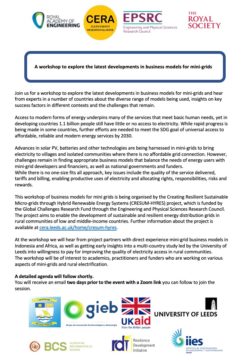
CoP26 - "Climate Justice and Universal Energy Access: Insights from Africa", 01.11.2021
As part of the events of CoP26, our team has been invited to attend a panel at University of Strathclyde (Glasgow, UK) on "Climate Justice and Universal Energy Access: Insights from Africa".
Energy is the golden thread that connects economic growth, social equity and environmental sustainability; however, it is also the leading contributor of greenhouse gases and the global climate crisis. Almost 1 billion people have no access to a secure source of energy, many of whom are facing the most severe impacts of climate change for which they’ve contributed least to cause.
Click here to watch the video produced by the CREEC team in Uganda to showcase the latest progress in climate justice.
RDI Webinar - Rural Electrification in Sumba, Indonesia - March 2022 (online)
Rural Electrification & Renewable Energy Development in Sumba
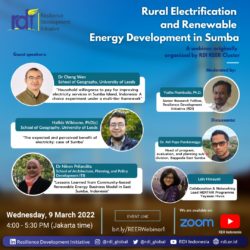
Indonesia’s rapid development has led to a rise in the country’s electrification ratio up to 98.05%. However, persistent energy distribution issues in several provinces are still apparent. Sumba island is one of the least-developed regions in Indonesia, which issues have been addressed through various renewable energy programs implemented by the government and other development actors. Sumba has two main grid systems, Waikabubak and Waingapu, of about 5.5 MW with a 2.5 MW base load respectively. The energy demand on this sparsely electrified island is increasing linearly to regional economic development and population growth. Based on PLN information, the electricity demand in Waingapu and Waikabubak has grown. However, the low electrification ratio in Sumba Island is not caused by its grid capacity, rather the difficulty in connecting everyone to it. As a way to respond to the needs for energy and electricity, stakeholders have tried to harness renewable energy (RE) technology as an alternative.
In acknowledgement of all of the points stipulated above, Resilience Development Initiative (RDI) from Indonesia, Leeds University from the United Kingdom, CREEC from Uganda, and Dar Es Salam University from Tanzania collaborated on research titled: "Creating resilient sustainable microgrids through hybrid renewable energy systems'' in 2019. The purpose of this research is to develop and validate the design of holistic micro-grids with hybrid systems intended for rural areas in developing countries, one of which is Indonesia, with a case study on Sumba. This study looks at the development of RE in Sumba especially in terms of (i) social-demographic findings, (ii) economic implications by considering communities’ willingness to pay, (iii) biofuel as a potential for new and renewable energy, and (iv) stakeholder analysis. Based on the research team’s recent visits to Sumba Island, uncovered preliminary findings have showcased several issues related to technology, tariffs and investment, operations and maintenance, public acceptance, to coordination between stakeholders as challenges that can potentially hinder sustainable and equitable growth of RE in meeting the island’s electrification targets.
The first national workshop had been conducted in 2019 to serve as a platform to gather related stakeholders along with local, national, and international academicians, thus producing recommendations throughout the workshop. As an ongoing output of the research, this webinar therefore stands to force knowledge and information sharing from the further findings, thus gaining a greater deal of cooperation between key stakeholders in the energy and electricity sector based on the lesson learned. By bringing together the key stakeholders, this webinar is expected to open up a discussion related to how the research results have implications for the local and national regulatory transformation, technology system operation and maintenance, as well as other detailed implementation of energy and electricity-related planning. Moreover, international attendance and collaboration are expected to contribute to global issues, especially those in regard to climate change and clean energy transition to sustain a growing global population.
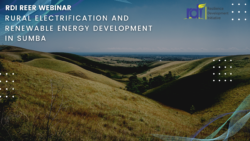
CRESUM-HYRES Policy Brief Training, CREEC 24-25 March 2022 - Kampala (Uganda)
Our partners at CREEC will hold a training on policy briefs writing on March 24th-25th at Makerere University, in Kampala (Uganda).
Policy briefs are a key tool to present research and recommendations to a non-specialized audience. They serve as a vehicle for providing evidence-based policy advice to help readers make informed decisions.
This training's aim is to develop strong policy brief skills which distill research findings in plain language and draws clear links to policy initiatives. The best policy briefs are clear and concise stand-alone documents that focus on a single topic.
Read the full program here.
The Team already produced some high quality policy briefs (available in Publications Overview), including The Family Case for Clean Energy.
A policy brief template is available here.
Meet the Trainer
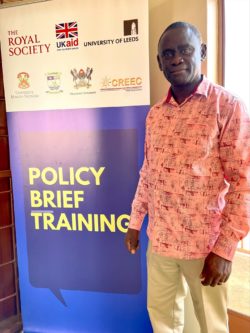 Mr James Baanabe is the lead trainer for our training on Policy Brief development. Mr Baanabe has 24 years experience working in the Ministry of Energy and Mineral Development in Uganda. During his time at Ministry he was involved in the implementation of the Energy Policy for Uganda 2002 and the Renewable Energy Policy 2007. He also supervised the review of the Energy Policy 2002, headed the team revising the Electricity Act 1999 and the Electricity Amendment Bill 2019, which is now in place.
Mr James Baanabe is the lead trainer for our training on Policy Brief development. Mr Baanabe has 24 years experience working in the Ministry of Energy and Mineral Development in Uganda. During his time at Ministry he was involved in the implementation of the Energy Policy for Uganda 2002 and the Renewable Energy Policy 2007. He also supervised the review of the Energy Policy 2002, headed the team revising the Electricity Act 1999 and the Electricity Amendment Bill 2019, which is now in place.
Cheney Fellowship - Talk by Omar Masera - 5th July 2022, University of Leeds
Challenges for a just and sustainable energy transition in the global South: The case of Mexico
The debate on energy transitions has been largely dominated by the “green growth” paradigm, according to which renewable energy sources will simply substitute fossil fuels without changing current consumption patterns or their distribution within and among nations. Using Mexico as a “case study” of the Global South, I will show the contradictions of energy green-growth strategies and argue that the only way out of the current global socio-environmental crisis is to build alternative “imaginaries” that rely on solidarity, cooperation, democratization, equity, decentralization, sufficiency, and localization. This new paradigm implies a bottom-up, basic needs end-use approach to energy planning, which acknowledges: a) that there are biophysical boundaries that limit the continuous expansion of consumption; b) that the large and increasing inequalities in energy use among and within countries need to be addressed; c) that access to adequate energy services constitutes a universal right and as such, eradicating energy poverty should be a priority goal; and d) that local renewable energy sources and eco-friendly end-use technologies should increasingly become the basis of the energy system.
About the speaker
Professor Omar Masera is the University of Leeds Cheney Fellow. He is full-time professor at the Instituto de Investigaciones en Ecosistemas y Sustentabilidad, UNAM where he is also Director of the Bioenergy Laboratory and the Ecotechnology Innovation Research Unit. He leads the Cluster of Solid Biofuels. Professor Masera received the National Research Award for young scientists of the Mexican Academy of Sciences in 2000, the Nobel Peace Prize in 2007 as a member of IPCC, the Ashden Awards to Sustainable Energy in 2006, and the National University Prize in 2015.
To see the recording of the talk, click here.
You can also find the PowerPoint of the presentation here.
ACERA International Workshop, 18-20 January 2023, Kampala (Uganda)
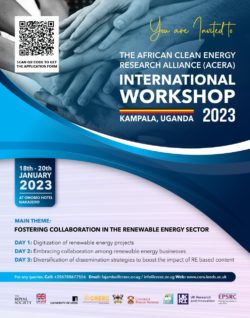
Fostering collaboration in the renewable energy sector
Partners from Uganda, Tanzania, Congo-Brazzaville and UK came together to present project research and facilitate interaction with community representatives, national government, international organisations, NGOs, researchers and academics.
- Day 1: Digitization of renewable energy projects
- Day 2: Embracing collaboration among renewable energy businesses
- Day 3: Diversification of dissemination strategies to boost the impact of RE based content
A selection of media coverage from the workshop is included below.
Videos
Uganda Broadcasting Corporation TV. Clean energy: research sharing for energy transition.
Watch >
YouTube. Introduction to African Clean Energy Research Alliance (in local language).
Watch >
YouTube. Renewable energy companies need to build strong alliances with media practitioners.
Watch >
Newspapers and magazines
NilePost. Experts urge government to invest in research in cheaper, clean energy.
Read more >
TheUgandan.com. CREEC calls for more efforts towards promotion of clean energy uptake in Uganda.
Read more >
Watchdog Uganda. Experts call for collaborative domestic energy policies towards digital technology.
Read more >
ChimpReports. Clean energy stakeholders call for investment and capacity building in the sector.
Read more >
